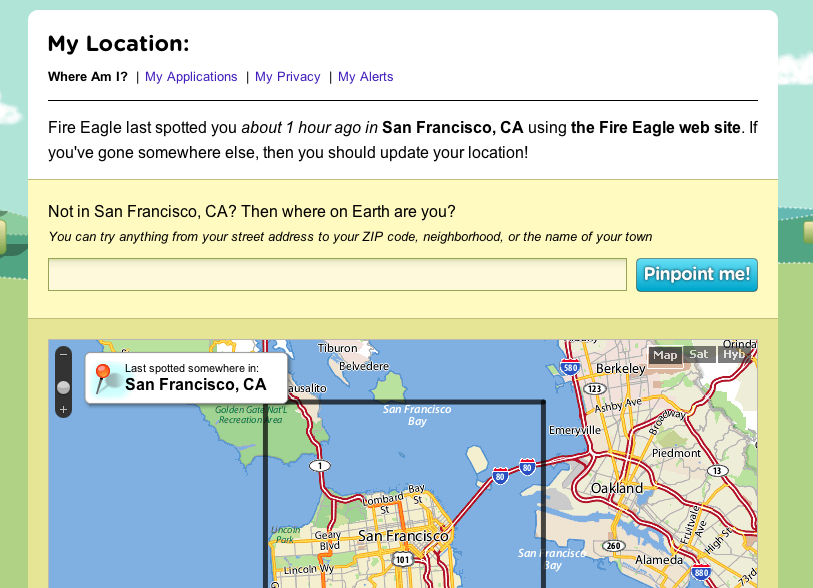 I’ve said it before, I’ll say it again: Location, location, location. As computing continues to go mobile it’s an increasingly important feature for many web services.
I’ve said it before, I’ll say it again: Location, location, location. As computing continues to go mobile it’s an increasingly important feature for many web services.
Knowing that, Yahoo has built a developer platform around location called Fire Eagle. Today, Yahoo is officially letting it spread it wings to the public.
The service began closed alpha testing in November of last year and it was formally unveiled the beta in March of this year. Since that time over 50 services have used it as a sort of switchboard between developers and location data. That’s a key point. Fire Eagle isn’t involved in locating you itself, it serves as a middle-man between services that offer that capability and those that wish to use it.
So why would any service use it rather than build its own solution? “Location is hard, Fire Eagle is easy,” Mike Malone a developer with micro-blogging service Pownce (one of Fire Eagle’s partners) noted at the launch event at the Yahoo Brickhouse today. For developers not specifically focused on location-based services, it can be tedious to try and build such a service to integrate. With Fire Eagle, location basically becomes a layer that can be simply added to the mix.
Fire Eagle also simplifies the growing number of location updates that come in from a wide range of services. It takes in all of this data and serves up the most relevant (most recent) location update.
It’s important to note that this location data isn’t just mean for location-based social networks which have been gaining popularity with the launch of the iPhone 3G. Coates cited an example of using location to find all the emails you sent while you were on a specific vacation.
As with all location-based services, the question of privacy is an important one. Yahoo Brickhouse head of product Tom Coates made it very clear that users are in complete control of what location information is made available. There is a “Hide Me” button that allows you to go-off-the-grid as it were if you are “having an illicit affair,” Coates joked.
Interestingly, you can also lie about your location. This is similar to functionality other services have such as Loopt, a location-based mobile social network.
The fact that many of the audience questions after the presentation also revolved around privacy shows just how important it is. Coates made it clear that all location information given to the third party partners was opt-in only. The service also sends out email reminders that you having your location data set to be shared. If you don’t respond to this email that you wish to keep sharing it, Fire Eagle will turn it off.
Another question asked if Fire Eagle had a role in Yahoo’s search marketing. While Coates wouldn’t rule out any third parties using your location information for advertising and marketing purposes, he said that Fire Eagle was wholly separate from Yahoo’s vision in this regard.
Location has powerful potential in the future of advertising. We’ve already heard that the aforementioned Loopt is separately working on its own location-based advertising solution.
There are already over 800 developer applications out there in the wild for services that hope to utilize Fire Eagle. Expect that number to grow.

VentureBeat's mission is to be a digital town square for technical decision-makers to gain knowledge about transformative enterprise technology and transact. Learn More

